Birds are fascinating creatures that bring joy and beauty to our lives. However, it can be distressing to witness a beloved pet bird losing its balance. Balance problems in birds can manifest in various ways and may indicate an underlying health issue.
Signs of losing balance include head tilting, unsteady perching, and wing dropping. A blood test or MRI will be effective to diagnose this health issue. Typically, birds lose balance due to ear infections, nutritional deficiencies, and toxicity.
Let’s discover the causes, diagnosis, and treatment options for birds experiencing balance-related problems.
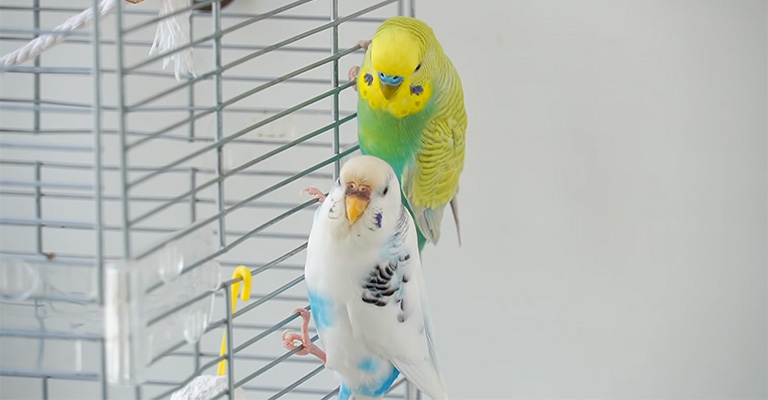
How Bird Lose Balance?
If a bird is experiencing balance problems, it could be indicative of various underlying issues. Here are some common symptoms of a bird losing balance:
Head Tilting
One common symptom of balance issues in birds is a noticeable tilt or tilt and rotation of the head. This can indicate problems with the bird’s vestibular system, which is responsible for maintaining balance.
Unsteady Perching
If you notice your bird struggling to maintain balance while perching, constantly shifting or falling off, it may be a sign of a balance problem. The bird may also struggle to land properly or hop from one surface to another.
Walking Difficulties
Birds with balance issues often exhibit an unsteady gait, stumbling, or falling while walking. They may appear wobbly or have difficulty coordinating their movements.
Wing Drooping
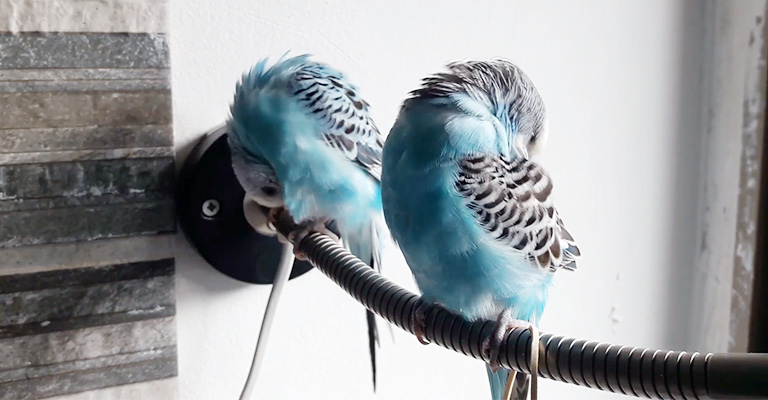
A bird experiencing balance problems may exhibit wing drooping on one side. This asymmetrical posture is an indication of the bird’s struggle to maintain stability.
Loss of Flight Control
Birds that lose their balance may have difficulties flying. They might crash into objects or have trouble landing gracefully, posing a risk to their safety.
Disorientation
Birds with balance problems may seem disoriented or confused. They may have difficulty finding their food or water dishes, getting in and out of their cages, or navigating their environment.
Abnormal Eye Movements
Rapid and involuntary eye movements, known as nystagmus, can accompany balance issues in birds. These abnormal eye movements can be observed when the bird is at rest or in motion.
Loss of Coordination
You may notice the bird struggling to coordinate its movements, such as having trouble hopping or climbing. The bird may exhibit overall clumsiness, knocking into objects or having difficulty perching.
How to Diagnose If My Bird Losing Its Balance?
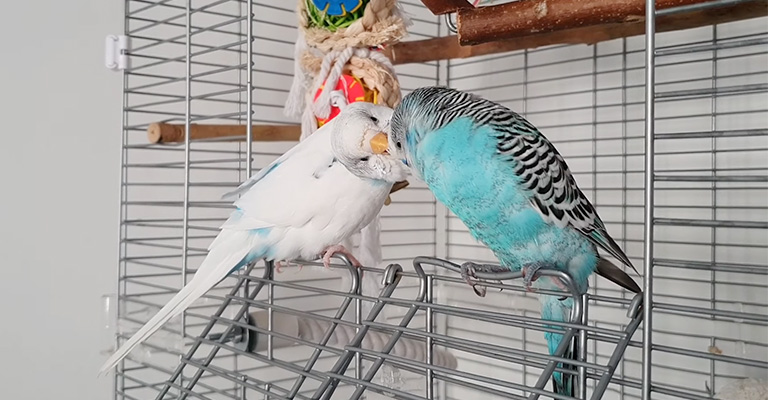
If your bird is exhibiting signs of balance problems, it is crucial to consult a qualified avian veterinarian for a proper diagnosis. The veterinarian will perform a thorough physical examination and may recommend additional tests, including:
- Blood tests: These can help identify any underlying infections or metabolic disorders that might be contributing to the bird’s balance issues.
- Imaging studies: X-rays or radiographs can provide valuable insights into the bird’s skeletal structure, while computed tomography (CT) scans or magnetic resonance imaging (MRI) may be used to assess the bird’s brain and inner ear.
- Vestibular function tests: These specialized tests evaluate the bird’s balance and vestibular system, helping to identify specific abnormalities.
Why Do Birds Lose Balance?
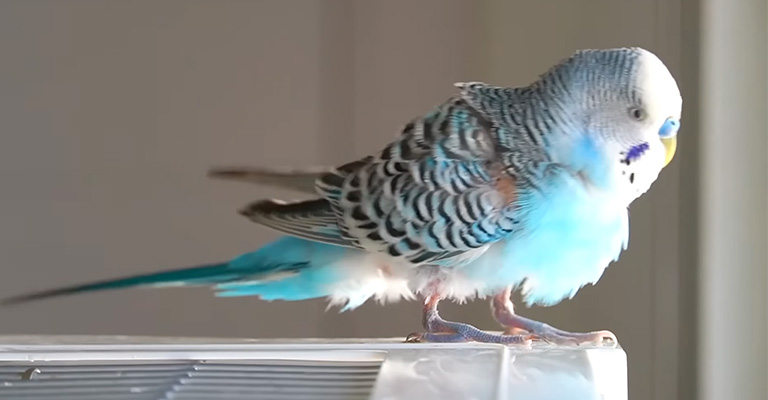
There are several possible causes for a bird losing balance. It can be as simple as an ear infection or more complex as a neurological disorder. Some common causes of losing balance in birds include:
Infections
Inner ear infections, such as otitis interna, can affect a bird’s balance. Bacterial, fungal, or viral infections can lead to inflammation or damage in the inner ear, disrupting the bird’s equilibrium.
Neurological Disorders
Certain neurological conditions can impact a bird’s balance. Examples include vestibular disease, which affects the bird’s vestibular system responsible for balance and spatial orientation, and conditions that affect the cerebellum, a part of the brain involved in motor coordination.
Trauma or Injury
Head injuries or trauma can result in damage to the bird’s brain or inner ear, leading to balance problems. Falls, collisions, or accidents can cause such injuries.
Toxicity
Exposure to certain toxins or chemicals can affect a bird’s neurological system and lead to balance issues. This could include ingestion of poisonous plants, exposure to harmful fumes or gases, or consumption of toxic substances.
Nutritional Deficiencies
Imbalances in a bird’s diet, particularly deficiencies in essential nutrients like vitamin E or vitamin B12, can result in neurological symptoms, including loss of balance.
Age-Related Factors
As birds age, they may become more prone to balance problems due to natural degeneration or age-related diseases.
Genetic or Congenital Conditions
Some birds may be born with genetic or congenital conditions that affect their balance. These conditions can be inherited or developed during embryonic development.
Tumors or Growths
The presence of tumors or growths, particularly in the brain or inner ear, can disrupt the bird’s balance and coordination.
It is crucial to have a bird exhibiting balance problems evaluated by a veterinarian or avian specialist. They will be able to conduct a thorough examination, perform diagnostic tests if necessary, and determine the specific cause of the bird’s balance issues. Treatment will depend on the underlying cause and may include medication, supportive care, dietary changes, or other interventions.
What Is the Treatment of Bird Losing Balance?
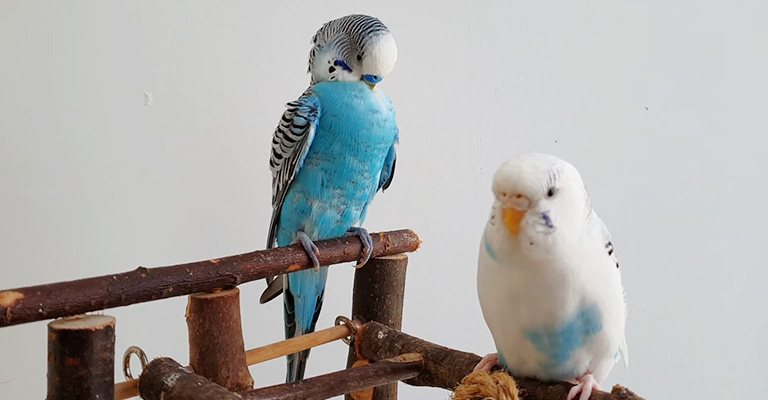
Treatment of Bird Losing Balance:
Veterinary Examination
- The first step is to take your bird to a qualified avian veterinarian for a thorough examination.
- The vet will assess the bird’s overall health, conduct a physical examination, and ask about any recent changes in behavior or diet.
Diagnostic Tests
- The vet may recommend diagnostic tests to identify the underlying cause of the balance issue.
- These tests may include blood work, X-rays, CT scans, or an MRI to understand the bird’s condition better.
Medication or Treatment Plan
- The vet may prescribe medication or recommend a specific treatment plan depending on the diagnosis.
- Antibiotic or anti-inflammatory drugs may be prescribed if an infection or inflammation is causing the balance problem.
- The vet may suggest dietary changes or supplements if a nutritional deficiency is identified.
Supportive Care
- Providing the bird with a safe and comfortable environment is crucial during its recovery.
- Ensure the cage is secure and free from any hazards contributing to falls or injuries.
- Offer soft perches or padding to assist the bird with balance and prevent further accidents.
Physical Therapy and Rehabilitation
- Sometimes, a bird losing balance may benefit from physical therapy or rehabilitation exercises.
- These exercises improve the bird’s coordination, muscle strength, and balance.
- Your avian veterinarian or an avian specialist can guide you on exercises suitable for your bird’s condition.
Follow-up Visits
- Regular follow-up visits to the avian veterinarian are essential to monitor the bird’s progress.
- The vet may adjust the treatment plan based on the bird’s response or recommend additional tests if necessary.
It’s important to note that the treatment for a bird losing balance depends on the underlying cause, which can vary significantly. Therefore, seeking professional veterinary care is crucial to ensure an accurate diagnosis and appropriate treatment for your bird’s situation.
Frequently Asked Questions
The potential for a complete cure depends on the underlying cause of the balance issues. With prompt diagnosis and appropriate treatment, many birds can experience significant improvement or even a complete resolution of their balance problems.
Recovery time varies depending on the cause and severity of the balance problems. Some birds may show improvement within a few weeks, while others may require a more extended period for recovery.
While it may not be possible to prevent all balance problems, providing a nutritious diet, a safe and enriching environment, and regular veterinary care can significantly reduce the risk.
It is crucial to consult a veterinarian for proper diagnosis and treatment. Home remedies may not address the underlying cause and could potentially worsen the bird’s condition.
In cases where the bird’s quality of life is significantly compromised, euthanasia may be considered as umane option. However, this decision should be made in consultation with a knowledgeable avian veterinarian.
Final Words
That was all about ‘Why is my bird losing balance’. Observing a bird losing its balance can be concerning, but with the right diagnosis and treatment, many birds can regain their stability and lead healthy lives. If you notice any symptoms of balance problems in your bird, it is essential to seek veterinary attention promptly.
By addressing the underlying causes and providing appropriate care, you can give your feathered friend the best chance for a full recovery and a balanced existence.